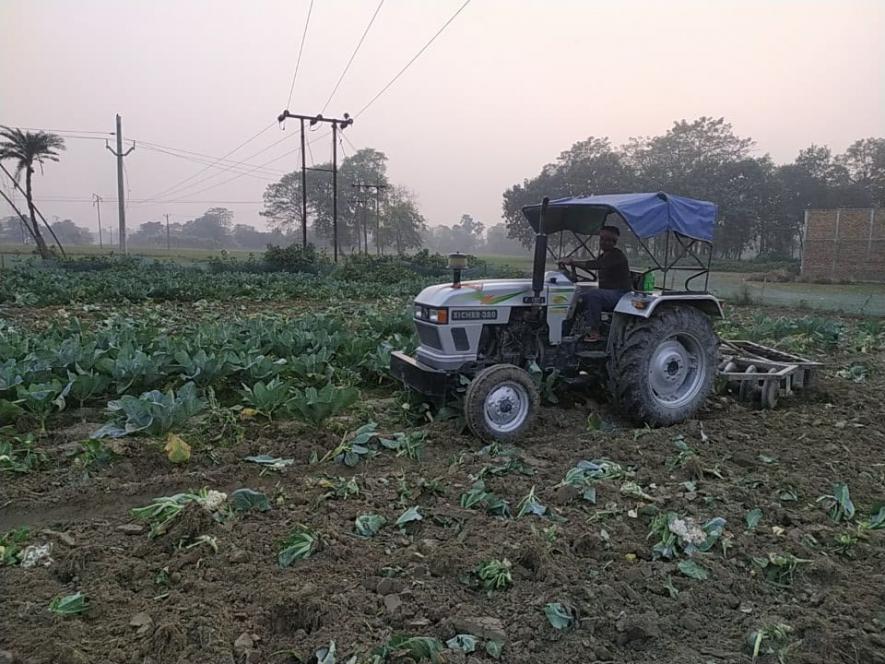Union Minister Credits New Farm Laws for Bihar Farmer’s Cauliflower Sale, Reality Check Punctures Claim

New Delhi: The three agriculture laws enacted recently by the Central government to bring “reforms” into the sector have emerged as bone of contention between farmers and the government, with peasant leaders threatening to intensify protests across the country if the government does not agree to repeal the legislations in the next round of meeting on January 4. The farming community has already been laying siege at four major entry points of the national capital since November 26, 2020.
With a GDP contribution of 16% and despite being the largest sector for employment in the country, why is agriculture no more a desirable profession? Why are farmers agitated with the much touted “reforms”? Let’s understand with an example.
You may remember a viral video footage wherein a farmer could be seen destroying his ready-to-harvest cauliflower by running a tractor over it in his field. His name is Om Prakash Yadav — a 34-year-old farmer who owns around 4.5 bigha (2.81 acres; 1 acre = 1.6 bigha) of ancestral land and 9 acres of leased land. He belongs to Muktapur panchayat in Bihar’s Samastipur district. He had grown cauliflowers on 6.5 bighas (4.06 acres) of land.

When he had to harvest and sell the vegetable in the local bazar samiti (local market committee), the price crashed to a rupee or even less than a rupee per kilogram. Finding himself unable to recover even the labour cost of harvesting and expenditure on packing and transportation, let alone the total input costs on the cultivation, he decided to destroy the crop rather than selling it.
“I was so frustrated that I destroyed the cauliflowers in 4.5 of the 6.5 bighas on December 14. There was no logic of selling the vegetable if even the costs of harvesting, packing, loading and unloading, and transportation were not recovered, he told NewsClick, adding that total production was somewhere around 250 quintals (25 tonnes).
He could sell only 145 quintals — which he had not destroyed.
As the video surfaced on the social media, it spread like a wildfire — with several news channels and publications carrying the news. In the middle of ongoing farmers’ protests across the country, it came as an embarrassment to the Central government led by the Bharatiya Janata Party (BJP), which is also an alliance partner of the ruling coalition in Bihar.
Notably, Bihar is the state where the agriculture sector was deregulated with removal of the government’s control way back in 2006. The new farm laws, which focus on sale, price and the storage of farm produce, set up a similar national framework and they don’t mention a minimum support price (MSP).
The earlier laws had protected farmers from the free market for decades. At present, farmers from a few states sell their produce at government-run procurement centres, where they have a greater chance of getting the MSP for their produce. Farmers are afraid that they will be exploited by large corporations otherwise, which will dictate prices.
The laws also allow private companies to hoard essential items for future sale. Until now, only the government could hoard essential supplies for food security.
As Yadav’s video went viral, the government had to swing into action and do some damage control. Yadav got a call from the office of Union Minister Ravi Shankar Prasad, who also hails from Bihar.
“I was asked by the PA (personal assistant) of the minister to visit the nearby CSC (Common Service Centre) to get myself registered. Following the online registration, I could digitally sell the rest of the cauliflowers at Rs 10 per kilogram to Agri10x (a Pune-based agriculture marketing service platform where farmers can sell online their agricultural produce at fixed prices). But the company, too, did not buy the entire consignment of 145 quintals. I could sell only 95 quintals there in two lots; I had to sell the rest 45 quintals at three different prices (Rs 4, 5 and 6 per kilogram) in the local market where the price by then had climbed back,” he said.
Launched in 2009 and revamped in 2015 under the Central government’s ‘Digital India’ programme, the CSCs are physical facilities for delivering government’s e-services to rural and remote locations where availability of computers and Internet is negligible or mostly absent.
This is not the first occasion when Yadav has suffered losses. In September last year, he had sown cauliflowers on 4.5 bigha or 2.81 acres. But incessant and heavy rainfall for over a month caused flooding in the field. “Waterlogging was so severe that not even one plant survived,” he added, claiming that he altogether suffered a loss of around Rs 4.5 lakh.
Even previously, he had suffered the same fate. “In the last cropping season of September-November, I had sown wheat on 3.25 acres of land. After the entire crop was destroyed, I submitted LPC (land possession certificate) to get a subsidy against the affected crop from the Bihar government under the Krishi Input Subsidy Scheme (agricultural input subsidy scheme). Do you know how much I got? It was Rs 1,090 for the total damage,” he said, narrating the sorry state of affairs of agriculture in the state.
Yadav is a debt-ridden farmer who had borrowed Rs 3 lakh from Kisan Credit Card two years ago. He has not been able to pay interest for over a year because of the successive crop failures and low income from his harvests.
Also read: Haryana: Farmers Garner Support with Three-Day Tractor Rally in Villages
“My financial condition has become so grim that I don’t have money for the next crop. The minister has assured me that he will meet me in person. If I get any help from the government, then only I will be able pay the accumulated interests and sow the next crop. In case of no help, I will have no option but to follow the step a debt-hit farmer, after losing all hopes, takes,” said the father of three young children, hinting at the possibility of death by suicide.
ABOUT AGRI10x
AGRI10x’s website claims that it is the world's first Artificial Intelligence and blockchain-enabled global e-marketplace connecting farmers with traders. It was launched in 2019. Its founder, Pankajj P Ghode, has also showered praise on Prime Minister Modi.
The company entered a deal with the Government of India in February 2020 to have an “exclusive access” to five lakh CSCs across India to set up “village-level entrepreneurs (VLEs)”.
But this is not the only option for farmers to sell their produce online. There are other players as well. National Agricultural Cooperative Marketing Federation of India (NAFED) also has its e-platform for the farmers who want to sell their products in other states.
UNANSWERED QUESTION
The online sale of farm produce was possible even before the three farm laws were enacted by the Centre. So, it’s crystal clear that the laws have nothing to do with the sale of cauliflowers cultivated by Om Prakash Yadav.
Despite this, the Union law minister credited the new farm laws for the sale in a series of tweets, insisting that the farmer could sell his product at a price 10 times higher times the local rate through the online platform after the new laws were enacted. Based on this, several other BJP leaders too tweeted the same, crediting the three controversial laws for Yadav’s sale.
Also read: Prison of Poverty: Agri Workers’ Wages Have Barely Increased in Modi Years
Get the latest reports & analysis with people's perspective on Protests, movements & deep analytical videos, discussions of the current affairs in your Telegram app. Subscribe to NewsClick's Telegram channel & get Real-Time updates on stories, as they get published on our website.























